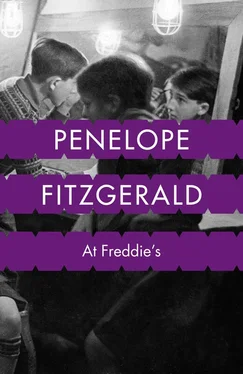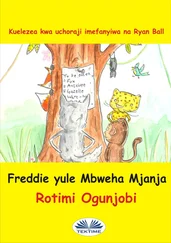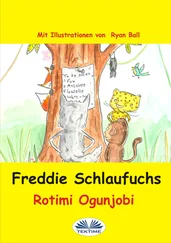At Freddie’s
Penelope Fitzgerald

From the reviews of At Freddie’s From the reviews of At Freddie’s Penelope Fitzgerald: Preface by Hermione Lee, Advisory Editor Introduction Dedication Chapter 1 Chapter 2 Chapter 3 Chapter 4 Chapter 5 Chapter 6 Chapter 7 Chapter 8 Chapter 9 Chapter 10 Chapter 11 Chapter 12 Chapter 13 Chapter 14 Chapter 15 Chapter 16 Chapter 17 By the Same Author Copyright About the Publisher
‘The wit is crisp and dry, scenes and characters are deftly skewered. Whether you view the theatre as a noble passion or a wasting disease, you are equally certain to be regaled.’
Guardian
‘Enjoy the knowingness of the awful children, the weary fumblings of the professional actors, the constant witticisms at the expense of pretentious directors. An enjoyable, sharp novel … a delicious refreshment.’
Margaret Forster
Contents
Cover
Title Page At Freddie’s Penelope Fitzgerald
From the reviews of At Freddie’s From the reviews of At Freddie’s From the reviews of At Freddie’s Penelope Fitzgerald: Preface by Hermione Lee, Advisory Editor Introduction Dedication Chapter 1 Chapter 2 Chapter 3 Chapter 4 Chapter 5 Chapter 6 Chapter 7 Chapter 8 Chapter 9 Chapter 10 Chapter 11 Chapter 12 Chapter 13 Chapter 14 Chapter 15 Chapter 16 Chapter 17 By the Same Author Copyright About the Publisher ‘The wit is crisp and dry, scenes and characters are deftly skewered. Whether you view the theatre as a noble passion or a wasting disease, you are equally certain to be regaled.’ Guardian ‘Enjoy the knowingness of the awful children, the weary fumblings of the professional actors, the constant witticisms at the expense of pretentious directors. An enjoyable, sharp novel … a delicious refreshment.’ Margaret Forster
Penelope Fitzgerald: Preface by Hermione Lee, Advisory Editor
Introduction
Dedication
Chapter 1
Chapter 2
Chapter 3
Chapter 4
Chapter 5
Chapter 6
Chapter 7
Chapter 8
Chapter 9
Chapter 10
Chapter 11
Chapter 12
Chapter 13
Chapter 14
Chapter 15
Chapter 16
Chapter 17
By the Same Author
Copyright
About the Publisher
Penelope Fitzgerald
Preface by Hermione Lee, Advisory Editor
When Penelope Fitzgerald unexpectedly won the Booker Prize with Offshore , in 1979, at the age of sixty-three, she said to her friends: ‘I knew I was an outsider.’ The people she wrote about in her novels and biographies were outsiders, too: misfits, romantic artists, hopeful failures, misunderstood lovers, orphans and oddities. She was drawn to unsettled characters who lived on the edges. She wrote about the vulnerable and the unprivileged, children, women trying to cope on their own, gentle, muddled, unsuccessful men. Her view of the world was that it divided into ‘exterminators’ and ‘exterminatees’. She would say: ‘I am drawn to people who seem to have been born defeated or even profoundly lost.’ She was a humorous writer with a tragic sense of life.
Outsiders in literature were close to her heart, too. She was fond of underrated, idiosyncratic writers with distinctive voices, like the novelist J. L. Carr, or Harold Monro of the Poetry Bookshop, or the remarkable and tragic poet Charlotte Mew. The publisher Virago’s enterprise of bringing neglected women writers back to life appealed to her, and under their imprint she championed the nineteenth-century novelist Margaret Oliphant. She enjoyed eccentrics like Stevie Smith. She liked writers, and people, who stood at an odd angle to the world. The child of an unusual, literary, middle-class English family, she inherited the Evangelical principles of her bishop grandfathers and the qualities of her Knox father and uncles: integrity, austerity, understatement, brilliance and a laconic, wry sense of humour.
She did not expect success, though she knew her own worth. Her writing career was not a usual one. She began publishing late in her life, around sixty, and in twenty years she published nine novels, three biographies and many essays and reviews. She changed publisher four times when she started publishing, before settling with Collins, and she never had an agent to look after her interests, though her publishers mostly became her friends and advocates. She was a dark horse, whose Booker Prize, with her third novel, was a surprise to everyone. But, by the end of her life, she had been shortlisted for it several times, had won a number of other British prizes, was a well-known figure on the literary scene, and became famous, at eighty, with the publication of The Blue Flower and its winning, in the United States, the National Book Critics Circle Award.
Yet she always had a quiet reputation. She was a novelist with a passionate following of careful readers, not a big name. She wrote compact, subtle novels. They are funny, but they are also dark. They are eloquent and clear, but also elusive and indirect. They leave a great deal unsaid. Whether she was drawing on the experiences of her own life – working for the BBC in the Blitz, helping to make a go of a small-town Suffolk bookshop, living on a leaky barge on the Thames in the 1960s, teaching children at a stage school – or, in her last four great novels, going back in time and sometimes out of England to historical periods which she evoked with astonishing authenticity – she created whole worlds with striking economy. Her books inhabit a small space, but seem, magically, to reach out beyond it.
After her death at eighty-three, in 2000, there might have been a danger of this extraordinary voice fading away into silence and neglect. But she has been kept from oblivion by her executors and her admirers. The posthumous publication of her stories, essays and letters is now being followed by a biography ( Penelope Fitzgerald: A Life , by Hermione Lee, Chatto & Windus, 2013), and by these very welcome reissues of her work. The fine writers who have provided introductions to these new editions show what a distinguished following she has. I hope that many new readers will now discover, and fall in love with, the work of one of the most spellbinding English novelists of the twentieth century.
I first encountered At Freddie’s – and its author – in curious, rather Penelopean (or should that be Fitzgeraldian?) circumstances. Sometime in 1987, I received a letter from a certain Jerry Epstein, hitherto unknown to me, telling me to get in touch with him, when I would hear something to my advantage. He had, he told me, acquired the rights to At Freddie’s , and he believed that I (who had never written or directed a film before) was the ideal – the only – person to write and direct it. Jerry was short, bearded and oddly shapeless, like a lump of clay abandoned by the sculptor before he had completed his task, but enthusiasm and big laughter exploded out of him. It turned out that he had directed a well-regarded film of Elmer Rice’s 1923 play The Adding Machine , but his great claim to fame was that he had been Charlie Chaplin’s last producer; he made everything seem not only possible, but imminent. I walked away from the meeting thinking that Orson Welles’s mantle of actor-director-writer was about to descend on me, and set about reading the book, and everything else by its author that I could get my hands on.
Читать дальше













